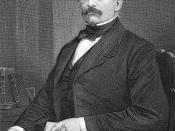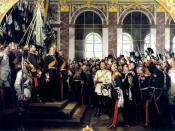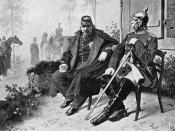Through the political brilliance of Otto von Bismarck Germany was able to unify, in 1871, as well as become a major European power. After the unification, he served for nineteen years, as the first Chancellor of Germany. During his reign, he put together a masterful foreign policy plan, which preserved peace in Europe for almost two decades.
During his nineteen year reign as Chancellor of Germany, Bismarck had unbridled access to the foreign policy of the German state. Kaiser William I had installed Bismarck as Prime Minister before Germany was unified and stayed in the background, while Bismarck ran the government.
During his Chancellorship, the two main concerns for German power in the region were France and the Balkans. The Ottoman Empire, known at the time as the ÃÂsick man of Europe,ÃÂ was slowly dissolving and becoming ever more volatile. During the late nineteenth and the early twentieth centuries, extreme nationalism in the area created a ÃÂpowder kegÃÂ situation that was just waiting for a spark.
France was still disgruntled after having been defeated by Bismarck during the Franco-Prussian war in 1871. Bismarck recognized both of these situations and realized that a European war could flare up at anytime. He also realized that if such a war emerged Germany in turn would be forced to enter it.. His main foreign policy goals were to isolate the French, while calming ethnic tensions in the Balkans.
In order to accomplish these goals, Bismarck crafted several ingenious treaties and alliances. The first of these alliances, was the Dual Alliance in 1879 (Hanlon 1). This was an alliance between Germany and Austria-Hungary. During this time, relations between Austria-Hungary and Russia had been dwindling. This was due to the Russians attack of Turkey and the later establishment of the treaty of San Stefano. By agreeing...


